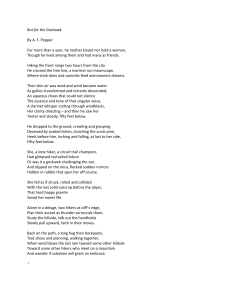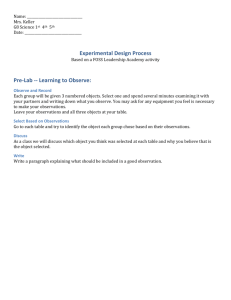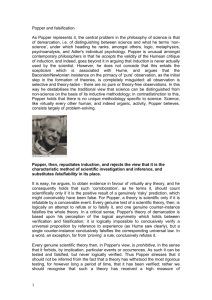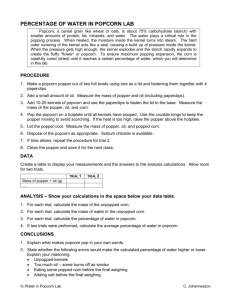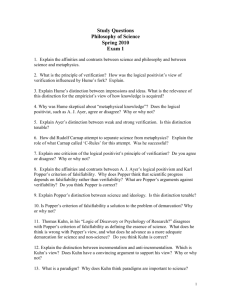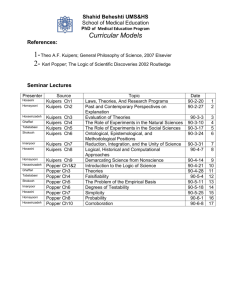popperian selectionism and its implications for education, or
advertisement
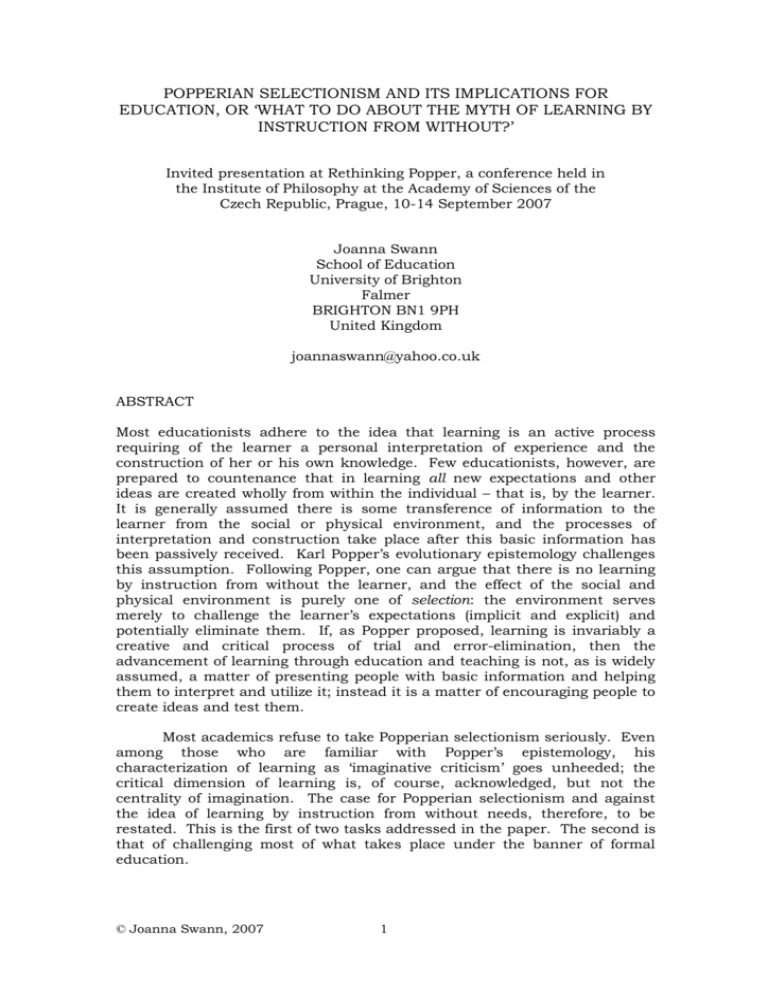
POPPERIAN SELECTIONISM AND ITS IMPLICATIONS FOR EDUCATION, OR ‘WHAT TO DO ABOUT THE MYTH OF LEARNING BY INSTRUCTION FROM WITHOUT?’ Invited presentation at Rethinking Popper, a conference held in the Institute of Philosophy at the Academy of Sciences of the Czech Republic, Prague, 10-14 September 2007 Joanna Swann School of Education University of Brighton Falmer BRIGHTON BN1 9PH United Kingdom joannaswann@yahoo.co.uk ABSTRACT Most educationists adhere to the idea that learning is an active process requiring of the learner a personal interpretation of experience and the construction of her or his own knowledge. Few educationists, however, are prepared to countenance that in learning all new expectations and other ideas are created wholly from within the individual – that is, by the learner. It is generally assumed there is some transference of information to the learner from the social or physical environment, and the processes of interpretation and construction take place after this basic information has been passively received. Karl Popper’s evolutionary epistemology challenges this assumption. Following Popper, one can argue that there is no learning by instruction from without the learner, and the effect of the social and physical environment is purely one of selection: the environment serves merely to challenge the learner’s expectations (implicit and explicit) and potentially eliminate them. If, as Popper proposed, learning is invariably a creative and critical process of trial and error-elimination, then the advancement of learning through education and teaching is not, as is widely assumed, a matter of presenting people with basic information and helping them to interpret and utilize it; instead it is a matter of encouraging people to create ideas and test them. Most academics refuse to take Popperian selectionism seriously. Even among those who are familiar with Popper’s epistemology, his characterization of learning as ‘imaginative criticism’ goes unheeded; the critical dimension of learning is, of course, acknowledged, but not the centrality of imagination. The case for Popperian selectionism and against the idea of learning by instruction from without needs, therefore, to be restated. This is the first of two tasks addressed in the paper. The second is that of challenging most of what takes place under the banner of formal education. © Joanna Swann, 2007 1 1. INTRODUCTION1 I am very grateful to Zuzana Parusnikova for inviting me to present a paper at Rethinking Popper. As an educationist, I have used Karl Popper’s evolutionary epistemology in the pursuit of the improvement of educational practice. I’ve drawn on his epistemology to challenge widespread assumptions about learning, particularly those embedded in the organisation and conduct of teaching. In short, I have been more concerned to exploit and disseminate Popper’s ideas than to criticise them. As Popper did so much in his lifetime that is of value to humankind, it seems churlish to suggest that he didn’t quite do enough. Nevertheless, I propose that there is a crucially important aspect of learning – the creative aspect – which Popper did not explore in any depth (at least not in his published works). Popper clearly acknowledged that learning is a creative process, and a theory of creativity in learning can be drawn out of, and developed from, his evolutionary epistemology. But the function of criticism in the growth of knowledge was his primary concern; criticism, rather than creativity, is at the heart of his non-inductivist and anti-justificationist philosophy. Popperians too have largely focused on the significance of criticism in the development of objectified knowledge, and they, by and large, have neglected to explore creativity as a necessary feature of any situation in which learning can be said to have taken place. This conference provides an opportunity for a collaborative exploration of Popper’s selectionist theory of learning, and its implications both for the organisation of education and our practice as teachers. We are all teachers in that there are occasions when we speak to and show things to others with the intention that they may learn; to be human is to engage in (and receive) teaching of this kind. Many of us are also teachers in the formal sense; that is, we have a professional role as teachers in an educational institution. In this presentation I will not assume that everyone at this session accepts Popper’s published ideas about learning, nor even that everyone has a good understanding of them. So I will begin by outlining Popper’s selectionist theory, or, rather, my interpretation of it, including my analysis of creativity and criticism in learning. I’ll then summarise the principal arguments in defence of Popper’s selectionist theory and against what seems to be the most common alternative view – which embraces what I disparagingly refer to as the myth of learning by instruction from without (Swann, 2007c). Finally, I will outline the educational implications of my discussion and I’ll address the question of what is to be done about the myth. 2. LEARNING BY INSTRUCTION FROM WITHIN The following quotations summarise Popper’s thesis with regard to learning: We do not discover new facts or new effects by copying them, or by inferring them inductively from observation, or by any other method of instruction by the environment. (Popper, 1994, p. 9) © Joanna Swann, 2007 2 [W]e learn only through trial and error. Our trials … are always our hypotheses. They stem from us, not from the external world. All we learn from the external world is that some of our efforts are mistaken. (Popper, 1999, p. 47) The process of learning, of the growth of subjective knowledge, is always fundamentally the same. It is imaginative criticism. This is how we transcend our local and temporal environment by trying to think of circumstances beyond our experience: by criticizing the universality, or the structural necessity, of what may, to us, appear … as the ‘given’ or as ‘habit’; by trying to find, construct, invent, new situations – that is, test situations, critical situations; and by trying to locate, detect, and challenge our prejudices and habitual assumptions. (Popper, 1979[1972], p. 148) Although Popper was vehemently opposed to the discussion of words and their meaning (Popper, 1992[1974], § 7), my experience in talking about learning with educationists has led me to accompany any exposition of a Popperian view of learning with what I term an evolutionary definition. I propose that learning is best defined as what takes place when an organism develops, in the context of experience, new expectations, specifically expectations that are not purely an outcome of genetic inheritance or random mutation (Swann, 2003b, 2007a). Perhaps I should stress that the word ‘expectation’ is used here both for conscious and unconscious phenomena; and it is not confined to ideas which the organism – the individual – would itself be capable of articulating. To clarify what is not learning: An amoeba may respond evasively when it encounters a toxic fluid; that is, its movements are not entirely random. Its response to this kind of situation can become more efficient, in that the period of time it takes to run through its repertoire of genetically programmed behaviours can become shorter. But aside from this efficiency gain, the repertoire remains unchanged (Petersen, 1988, pp. 34-35). An amoeba solves problems, but it is not a learning organism because it does not expand its repertoire of expectations and responses beyond those that are genetically programmed. You might wish to suggest that there is sleight of hand in what I have said so far, namely that I am defining learning in terms of newness, so it is hardly surprising that I argue that creativity is central to learning. But it seems to me that some kind of newness is inherent in what people are mostly talking about when they talk about learning. The issue about which there is the most widespread disagreement concerns the process by which the newness comes about, namely what happens when learning takes place. Significantly, changes in expectation are accompanied by changes in what the organism is capable of experiencing and in its potential responses to its environment – what it is capable of doing and is inclined to do. An ability to learn is a specific form of adaptability, and the ability to adapt confers, at least potentially, an evolutionary advantage. Although learning is dependent on maturation, it involves more than the fruition of inborn characteristics. A learning organism develops new expectations and © Joanna Swann, 2007 3 capabilities that may enable it to function more effectively in the situations in which it finds itself. According to Popper’s selectionism, the process by which expectations develop always involves trial and error-elimination, a critical and creative process of explicit or, more often, implicit problem solving. All our knowledge is either inborn or created by us through a process of trial and error. A learning organism is one that, so to speak, instructs itself from within – in the face of challenges from without. The effect of the social and physical environment is purely one of selection, the environment serving merely to challenge the learner’s expectations (implicit and explicit) and potentially eliminate them. The response of many people to this idea is incredulity: surely, they say, we do not engage in trial and error-elimination when listening to a set of instructions, chatting to our friends, and so on. I would argue that we do. Despite the many occasions when we are aware of our learning, most moment-by-moment learning takes place without our being aware of what has been learned, or even that learning has taken place. In order to understand what someone is saying we must solve a variety of problems; this we do rapidly and mostly at an unconscious level. We do not passively absorb what is said and there is no direct transfer of information. Whether or not we are aware of it, we are critical and creative listeners. In general, when learning is seen to take place in response to instruction (which is distinguishable from learning by instruction – Swann & Burgess, 2005), the learner will have made and tested informed guesses with regard both to the nature of the situation and what the teacher was trying to convey. You may be disinclined to acknowledge the imagination required to engage with what I’m saying, not least because such an activity is commonplace and unremarkable. The process itself is not entirely conscious, so you will not be aware of more than a few aspects of it. But I put it to you that the process of listening and making sense of what is being said is hugely creative. 3. CREATIVITY AND CRITICISM IN LEARNING It seems likely that most participants at this conference will have some familiarity with Popper’s simplified schema of conjecture and refutation (Popper, 1979[1972], p. 243), but I need to re-present it here in order to highlight the way in which the process it describes is both creative and critical: P1 TS EE P2 In this schema P represents a problem, TS a trial solution applied to the problem, and EE stands for error-elimination, the means by which some trials are eliminated. The elimination of an error gives rise to a new situation and, potentially, a new problem. For an organism to have a problem, it must be dissatisfied with, and thus implicitly or explicitly critical of, the state of affairs in which it finds itself – ‘hungry’, for example – and it must wish, by implication at least, to achieve a state of affairs it deems to be better, such as ‘not hungry’. But, © Joanna Swann, 2007 4 contrary to common understanding, problems have to be created rather than merely ‘identified’. It should be noted that many mismatches between expectation and experience remain unproblematised, and any one mismatch may be turned into a number of different problems (Swann, 1999, 2003b). Creativity may also occur at TS, when the organism responds to a problem with a trial solution: the learning individual may invent a course of action, a trial solution, which is entirely new to it, or it may adapt (rather than – as in the case of the amoeba – merely ‘contract’) a course of action that has already been developed. Error-elimination, EE, though clearly a critical aspect of problem solving, may also – in the case of some human learning – be the result of a creative act. While most animals are largely constrained to discover errors and limitations by happenstance, humans are well equipped to search for error, that is, to create test situations. This is one of the principal means by which we accelerate our learning. In general, by discovering error and specific limitation, we are put under pressure to create new problems, and with them new solutions. Criticism is often construed in terms of explicit statements of disapproval or rejection, such as ‘That’s wrong’ and ‘I’ve made a mistake’. But this view is too narrow. Criticism is also embedded in the thought that ‘I could try something else’ or the question ‘What else might I do?’ And it is present in any unstated and even unconscious degree of dissatisfaction that leads an individual to decide to do something rather than nothing, or to do one thing rather than another. In general, the value of criticism is to be judged by its effect in a particular circumstance. A criticism, even if valid, may be inappropriate if ultimately it serves to stifle creativity and inhibit further trial and error-elimination (Swann, 1983). 4. THE MYTH OF LEARNING BY INSTRUCTION FROM WITHOUT Many educationists adhere to the idea that learning is an active process requiring of the learner a personal interpretation of experience and the construction of her or his own knowledge. Yet few educationists, it seems, are prepared to countenance that in learning all new expectations and other ideas are created wholly from within the individual – that is, by the learner. It is generally assumed there is some transference of information to the learner from the social or physical environment, and the processes of interpretation and construction take place after this basic information has been passively received. With regard to hearing what someone says, the common assumption seems to be that some basic elements of what is being said are transferred, and what the effective listener then does is process these elements in such a way as to construct meaning. What is at issue here is a choice between two competing theories. One proposes that ‘No learning takes place by instruction from without’, the other that ‘Some learning takes place by instruction from without’. Although both theories are about events in the world, neither has the potential to be refuted by reference to empirical evidence. The competing theories are, in the Popperian sense, metaphysical rather than scientific, though they may nonetheless lead to the development of testable, that is, refutable, hypotheses (Swann, 2003a). © Joanna Swann, 2007 5 Perhaps you are thinking: ‘If the competing theories which support, respectively, “No learning takes place by instruction from without” and “Some learning takes place by instruction from without” are not susceptible to refutation by reference to empirical evidence, why should we care to argue about them?’ To which I would respond that the competing theories, regardless of their metaphysical status, have implications for what we do, and that the practice of education assumes to a large extent that some learning takes place by instruction from without. I further propose that if education were to be reconceived and redesigned in light of Popperian selectionism and the idea that no learning takes place by instruction from without, then the outcomes would be both significantly different and arguably better. Before looking at the implications of Popperian selectionism for educational practice, there are three important philosophical points to be made against the idea that some learning takes place by instruction from without. First, whereas Popperian selectionism presents a biological description of what happens when learning takes place, the idea that we receive informational elements (sense data) from the environment relies heavily on analogy and metaphor. The learner is conceived as functioning like a sponge into which ideas are absorbed, a bucket into which ideas are poured through the senses, a receiver to which ideas are transmitted, or a computer into which data is transferred and stored. But, quite clearly, we are not sponges, buckets, radio receivers or computers; nor do we have a brain or any other organ that functions in such a manner that the use of these analogies would imply. Our memories, for example, are an outcome of learning and they are used in processes where there is learning, but there is no memory organ. The function of the brain is to select and create; it has no means of taking in information (Edelman, 1992). It is surely incumbent on anyone who wishes to support the idea that there is learning by instruction from without the learner to provide an account of the process by which the informational elements are received, one which goes beyond analogy and metaphor to address the nature of learners as biological phenomena. As yet, no such account exists of learning by instruction from without. It might be argued that associationism constitutes a refutation of my claim, on the grounds that it is an account of learning by instruction from without. There are, of course, numerous critiques of associationism (see, for example, Popper, 1979[1972], ch 2, § 13), but what is important to the present discussion is that associationism is a theory about how basic informational elements come to be combined in the ‘mind’. What associationism does not provide is any kind of biological account of how these various irreducible elements – the elements that are combined – ‘enter the mind’ in the first place. I am aware that Popper’s selectionist account of learning has itself been construed as a metaphor because, for example, he proffers the idea of the mind as a searchlight as opposed to the mind as a bucket (Popper, 1979[1972], Appendix I). But although Popper uses the searchlight metaphor, he does so within the context of a much broader theory, a ‘descriptive epistemology’ (Campbell, 1974, p. 413) which explains that the © Joanna Swann, 2007 6 same process, not merely a similar process, applies to the growth of objective knowledge, individual learning, and the evolution of species. This process was summarised by Popper in his simplified schema of conjecture and refutation (as mentioned earlier). Evolutionary epistemology goes far beyond simple metaphor, and its nature was well described some 33 years ago by Donald Campbell (ibid.): An evolutionary epistemology [is] at minimum an epistemology taking cognizance of and compatible with man’s status as a product of biological and social evolution. … evolution – even in its biological aspects – is a knowledge process, and … the natural-selection paradigm for such knowledge increments can be generalized to other epistemic activities, such as learning, thought, and science. Second, I invite anyone who wishes to defend the idea that there is learning by instruction from without the learner to make a case for the existence of basic informational elements (or sense data). Note also that when basic informational elements are assumed to exist they are generally also assumed to provide true or certain information. So the challenge is to identify basic informational elements that are in some way true or certain. Given what we currently know, I put it to you that, in Popper’s words, ‘these data or elements do not exist at all. They are the inventions of hopeful philosophers’ (Popper, 1979[1972], p. 63). Third, if you would wish to argue that learners receive basic informational elements from the environment, I would ask you to explain why in any particular situation individuals receive some informational elements and not others. I anticipate that one type of explanation would refer to flaws in the ‘receiving mechanisms’ of would-be learners. Explanations of this kind, however, usually beg the question of why people with sensory disabilities or specific limitations of brain function are often highly successful learners; that is, they compensate for what they cannot do by developing what they can. This propensity is one we all possess. Also, an explanation is required to account for the fact that even when there are no assumed flaws in the learner’s receiving mechanisms, not everything that could be absorbed is taken in. Selection seems to be a fundamental part of the explanation. 5. WHAT IF THIS IS CORRECT? It would be naïve of me to think that any persons present who have hitherto assumed that, at least to some degree, learning involves the direct transference of informational elements from the social or physical environment will be persuaded to change their minds as a result of what I have said. I hope, however, that even if you do not agree with the general thrust of my argument you will be willing to consider its implications. If learning by instruction from without is a myth, and if it is better to view learning as invariably a critical and creative process of trial and errorelimination, then the advancement of learning through education and teaching is not a matter of presenting people with basic information and helping them to interpret and utilise it. Rather, it is a matter of encouraging people to create ideas and test them. To return to one of the earlier quotations from Popper (1979[1972], p. 148), imaginative criticism is the © Joanna Swann, 2007 7 means by which we ‘transcend our local and temporal environment’. I posit that formal systems of education generally do very little to bring about the transcendence that Popper describes. Of course, students learn when they are taught – they could scarcely do otherwise – but what they learn is often not what their teachers intend. And, more importantly, we need to entertain the idea that students’ learning may be significantly less than what it might be. We should not be complacent about the success of our education institutions; we have, I believe, the potential to ‘do education’ much better. Traditionally, educationists have, in general, vastly underestimated the human potential for imaginative criticism – because they have not recognised the extent to which it lies at the heart of what we, including the youngest children, do in order to succeed at even the most basic tasks. When educationists act on the assumption that there is some direct transference of information from the environment to the learner, they tend to focus their efforts on what they think they can control – on their own input as policymakers and/or teachers. The natural inclination of children to engage in exploratory activity – spontaneous trial and error-elimination – is then curtailed. What cannot be controlled is viewed with suspicion rather than treated as the primary resource. It follows that teachers initiate most of the planned learning activities, and students are expected to rely on teachers for fundamental decisions about what to do and when to do it. Mostly, too, students are not encouraged to question or criticise the material with which they are presented. The task of the student is to learn the syllabus, not question it. For much of the time, students are expected to replicate the arguments of others rather than develop arguments of their own. Creativity is a concept largely confined to ‘the arts’, and outside of those fields of activity (and to some degree even within them) it is not usually encouraged. Not only are opportunities to engage in trial and error-elimination limited, many schools are also unsafe places in which to discover errors and inadequacies because revealing them tends to occasion a penalty of some kind. Teachers are put under pressure to produce individuals who are able to perform a limited range of tasks according to narrowly conceived standards. In such circumstances, the tendency is to penalise the student for failing to understand, failing to give the prescribed answer, failing to agree, failing to conform. Formal education worldwide is largely controlled and organised by people who wish, perhaps for all the right reasons, to instruct, people who are preoccupied with a desire that children, adolescents and older students, learn specific things, things that they, the controllers and organisers, deem it important to teach. Thus a major obstacle to the exploitation of Popperian selectionism in educational practice is that those who wield the most power within formal systems are largely disinclined to favour the open-ended pursuit of learning and they are not predisposed to encourage either imagination or free-ranging criticality. 6. SO WHAT IS TO BE DONE? One fairly common response to the arguments I’ve outlined in this presentation is to say that Popper was wrong and that the substance of the discussion is without ‘justification’. There are, of course, critiques of © Joanna Swann, 2007 8 Popper’s work, but the rejection of his ideas is a more complex matter than is often implied when the citation of a critique is a precursor to the hasty dismissal of his arguments (see Burgess & Swann, 2003, for extended discussion of this topic). In contrast, a fairly common reaction on the part of Popperian thinkers is to suggest that Popper’s thesis with regard to learning is ‘old hat’, that it is widely known and does not need restating. If only this were true! With regard to the educational implications of Popper’s selectionist account of learning, there seem to be at least two distinct camps among Popperians. Members of one camp, the one to which I belong, support a learner-centred approach to teaching. In my own work, following that of Tyrrell Burgess (1975, 1977, 1979), I argue for the development and adoption of student-initiated curricula, that is, curricula conceived and formulated by the students themselves. I have argued that student-initiated curricula are crucial in fostering learner autonomy, in challenging students to develop the assumptions that influence their everyday lives, and as a means of helping students to deal with their learning problems (that is, what they want to learn but are having difficulty learning) (for example, in Swann, 1983, 2006, 2007b). Members of the other camp, seemingly the larger of the two, comprise those who favour what Richard Bailey has called the ‘criticalist curriculum’ (Bailey, 2000, pp. 192-97, 199-206). The criticalist curriculum is a means by which ‘children are introduced to “the best that has been known and thought in the world’’’ (p. 194). It differs from conventional school curricula in that critical discussion of public knowledge is a crucial element. By being initiated into the practice of critical discussion, students become able to ‘reassess’ and facilitate the development of their cultural heritage – but, I stress, only on the basis of someone else’s decision about the canon. I don’t propose to end this paper with an argument in support of student-initiated curricula, although I will certainly be inclined to defend the concept if required to do so during the open discussion. But in preparing this presentation it seemed that in order to advance the debate, Popperian educationists perhaps must first focus on a more basic educational problem, that of how to foster imaginative criticism – which I interpret as how to foster creativity and criticality not only in the development and testing of solutions to existing problems but also in problem formulation. This is a practical problem, hence its solution requires us to act, not merely talk about the issues or about what others might do (Swann, 2003a). Towards a solution: 1. I urge Popperians to promote, among educationists, discussion of Popper’s key ideas about learning, as summarised in the set of three quotations presented earlier in my presentation [at the beginning of section 2 of the paper]. 2. I urge all those who have been persuaded that everything the student thinks and does that is not inborn must have been created by the student (largely as a reaction to the challenges posed by the environment) to consider what this means for their own practice as teachers and, if appropriate, as participants in an education system. © Joanna Swann, 2007 9 3. I urge those who are so persuaded not only to think but to act, to engage in trial and error-elimination (a) with regard to their interactions with others – by adopting and responding to following the personal practical problem, ‘In my educational relationships, how can I support the creativity and criticality of others?’, and, if appropriate, (b) in their engagement with social structures – by adopting and responding to ‘How can I promote the development of educational structures that foster creativity and criticality?’ In respect of point (b), it seems to me essential that we counteract the propensity to corral children and older students in environments that inhibit autonomous activity, that discourage creativity and criticality and generally limit opportunities for trial and error-elimination. NOTE 1. In addition to the references provided in the main text of the paper, sections of the argument draw on Swann (2007a, 2007b, 2007c and, with Burgess, 2005). REFERENCES Bailey, R. (2000) Education in the Open Society – Karl Popper and Schooling. Aldershot, UK: Ashgate. Burgess, T. (1975) Choice is not enough – go for responsibility. Where (the Education Magazine for Parents), 100, pp. 5-7. Burgess, T. (1977) Education After School. London: Victor Gollancz. Burgess, T. (1979) New ways to learn. The Royal Society of Arts Journal, CXXVII (5271), pp. 143-57. Burgess, T. & Swann, J. (2003) The rejectability of Karl Popper: why Popper’s ideas have had so little influence on social practice. Higher Education Review, 35 (2), pp. 57-65. Campbell, D. T. (1974) Evolutionary epistemology, in P. A. Schilpp (ed.) The Philosophy of Karl Popper, Book 1. La Salle, IL: Open Court Publishing, pp. 413-63. Edelman, G. M. (1992) Bright Air, Brilliant Fire: On the Matter of the Mind. New York: Basic Books. Petersen, A. F. (1988) Why children and young animals play: a new theory of play and its role in problem solving. Monograph of The Royal Danish Academy of Sciences and Letters, Copenhagen, Historisk-filosofiske Meddelelser, 54, pp. 1-57. Popper, K. R. (1979) Objective Knowledge: An Evolutionary Approach. Oxford, UK: Oxford University Press (first edition 1972). Popper, K. R. (1992) Unended Quest: An Intellectual Autobiography. London: Routledge (first published as Autobiography of Karl Popper, in P. A. Schilpp (ed.) (1974) The Philosophy of Karl Popper, Book 1. La Salle, IL: Open Court Publishing, pp. 3-181). Popper, K. R. (1994) The Myth of the Framework: In Defence of Science and Rationality. London: Routledge (ed. by M. A. Notturno). Popper, K. R. (1999) All Life is Problem Solving. London: Routledge (some chapters trans. by P. Camiller). Swann, J. (1983) Teaching and the logic of learning. Higher Education Review, 15 (2), pp. 31-57. © Joanna Swann, 2007 10 Swann, J. (1999) What happens when learning takes place? Interchange, 30 (3), pp. 257-82. Swann, J. (2003a) How science can contribute to the improvement of educational practice. Oxford Review of Education, 29 (2), pp. 253-68. Swann, J. (2003b) A Popperian approach to research on learning and method, in J. Swann & J. Pratt (eds) Educational Research in Practice: Making Sense of Methodology. London: Continuum, pp. 11-34. Swann, J. (2006) How to avoid giving unwanted answers to unasked questions: realizing Karl Popper’s educational dream, in I. C. Jarvie, K. Milford & D. Miller (eds.) Karl Popper: A Centenary Assessment, Volume 3 – Science. Aldershot, UK: Ashgate, pp. 261-70. Swann, J. (2007a) Learning: an evolutionary analysis. Brighton, UK: University of Brighton (unpublished paper). Swann, J. (2007b) Teaching for a better world: the why and how of studentinitiated curricula, in D. Aspin & J. Chapman (eds) Values Education and Lifelong Learning: Philosophy, Policy, Programmes. Dordrecht, The Netherlands: Springer Press International, pp. 279-94. Swann, J. (2007c) The myth of learning by instruction from without. Higher Education Review, 40 (1), in press. Swann, J. and Burgess, T. (2005) The usefulness of Karl Popper’s selectionist theory of learning for educational practice. Learning for Democracy, 1 (3), pp. 7-22. © Joanna Swann, 2007 11

